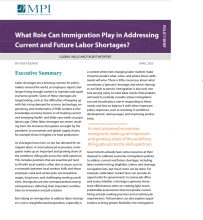What Role Can Immigration Play in Addressing Current and Future Labor Shortages
This brief from MPI’s Global Skills and Talent Initiative looks at the rising demand for immigrant labor in the wake of pandemic disruptions to economies and supply chains, both in high-skilled job sectors and in those needing fewer formal qualifications and with poorer working conditions. Given the fast-changing and unpredictable nature of labor markets, the brief argues, policymakers will need to be better informed and more strategic in balancing solutions, considering where immigration should play a role in meeting shortages and where to prioritize other, longer-term policy responses such as investments in workforce development, higher wages, and productivity improvements that help all workers. Key questions to be considered include what constitutes a genuine labor shortage, how shortages change over time, and the pros and cons of using immigrants to address such shortages. In addition to employer-sponsored immigration pathways, policymakers should consider more flexible non-employer-sponsored policies to admit immigrants with in-demand skills in certain occupations or sectors, as well as looking at what skillsets will be most valuable across jobs and providing integration supports to help immigrants thrive economically. The need to improve labor shortage data collection and analysis should also trigger better coordination among immigration, education, labor, and other policy stakeholders, paving the way for a more encompassing talent strategy. (Jeffrey Gross, Ph.D.)
Hooper, K. (2023, April). What Role Can Immigration Play in Addressing Current and Future Labor Shortages. Migration Policy Institute. https://www.migrationpolicy.org/research/immigration-addressing-labor-sh...

